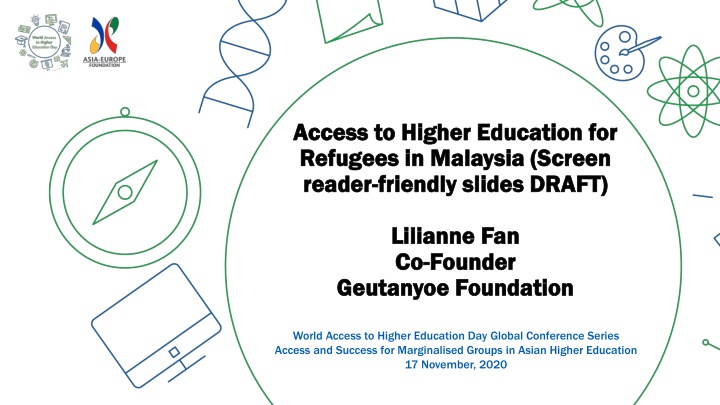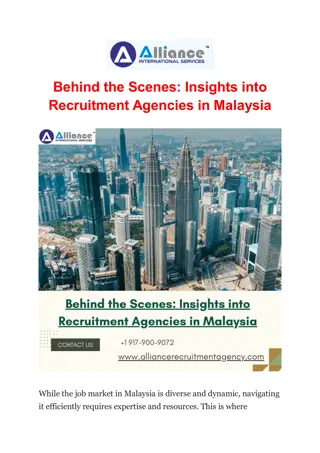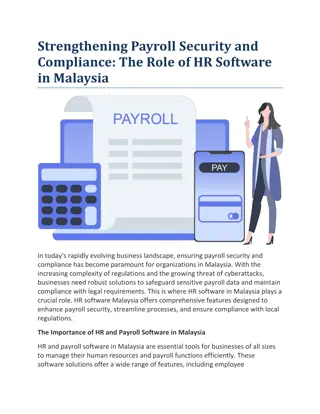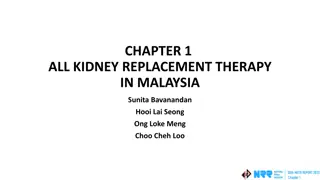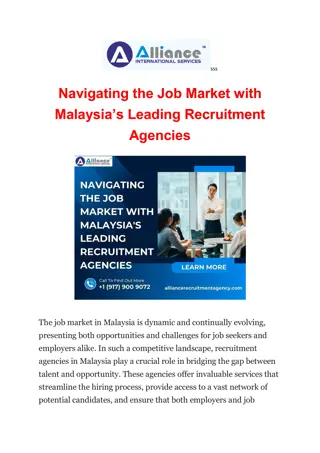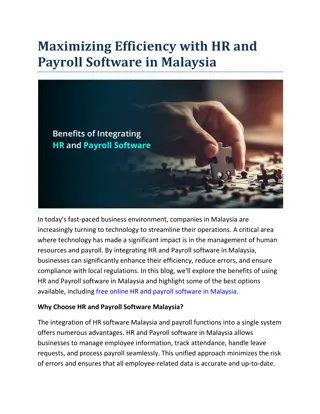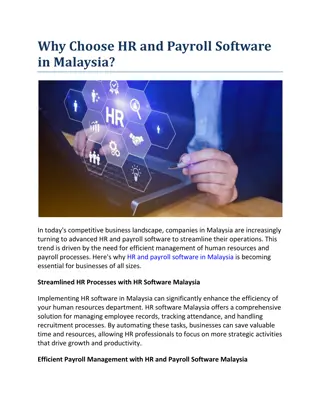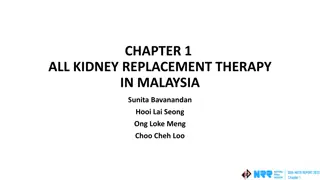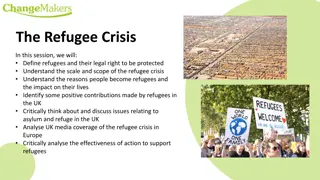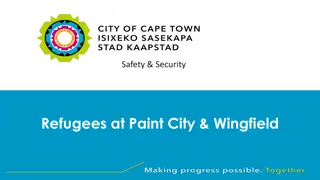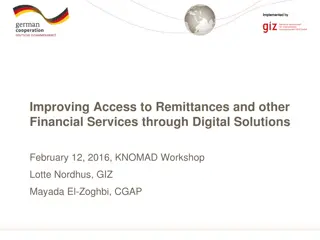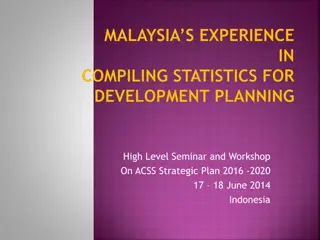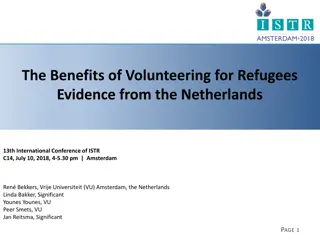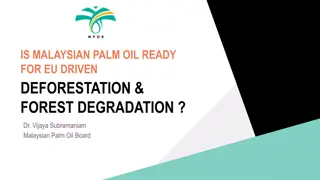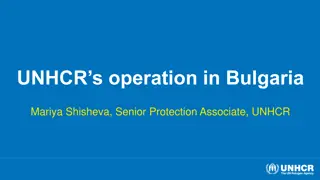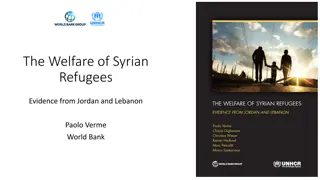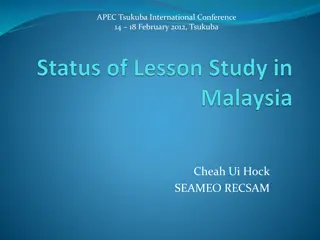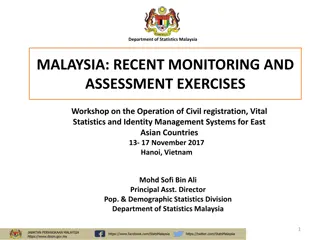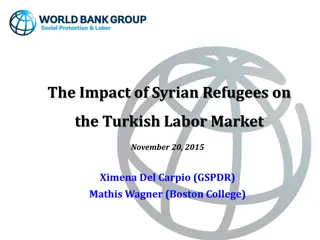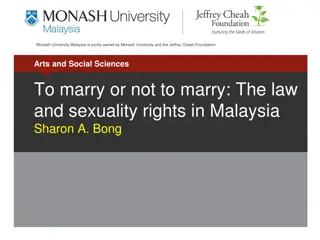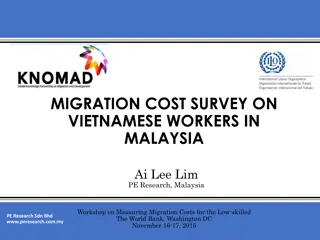Fostering Access to Higher Education for Refugees in Malaysia
The global trends show that access to higher education for refugees is limited, with only 3% having such access worldwide. In Asia Pacific, 7.7 million people of concern are hosted, including 3.5 million refugees. In Malaysia, as of early 2020, only 60 refugee youth were enrolled in tertiary education, highlighting the urgent need to enhance opportunities for higher education access for refugees in the country.
Download Presentation

Please find below an Image/Link to download the presentation.
The content on the website is provided AS IS for your information and personal use only. It may not be sold, licensed, or shared on other websites without obtaining consent from the author.If you encounter any issues during the download, it is possible that the publisher has removed the file from their server.
You are allowed to download the files provided on this website for personal or commercial use, subject to the condition that they are used lawfully. All files are the property of their respective owners.
The content on the website is provided AS IS for your information and personal use only. It may not be sold, licensed, or shared on other websites without obtaining consent from the author.
E N D
Presentation Transcript
Access to Higher Education for Access to Higher Education for Refugees in Malaysia (Screen Refugees in Malaysia (Screen reader reader- -friendly slides DRAFT) friendly slides DRAFT) Lilianne Lilianne Fan Co Co- -Founder Founder Geutanyoe Geutanyoe Foundation Foundation Fan World Access to Higher Education Day Global Conference Series Access and Success for Marginalised Groups in Asian Higher Education 17 November, 2020
Refugees and Higher Education: Global Trends Refugees and Higher Education: Global Trends According to UNHCR s annual Global Trends report, at the end of 2019 an unprecedented 79.5 million were displaced. Today, more than 29.6 million people worldwide are refugees. 84% of refugees are hosted in developing countries. 52% of refugees are children. In 2015, only 1% of refugee youth had access to higher education. Today, only 3% of refugees globally have access to higher education. World Access to Higher Education Day Global Conference Series #WAHED24 Access and Success for Marginalised Groups in Asian Higher Education 17 November, 2020
The Global Compact on Refugees Commitment to The Global Compact on Refugees Commitment to Education Education In line with national education laws, policies and planning, and in support of host countries, States and relevant stakeholders will contribute resources and expertise to expand and enhance the quality and inclusiveness of national education systems to facilitate access by refugee and host community children (both boys and girls), adolescents and youth to primary, secondary and tertiary ~ The Global Compact on Refugees, 2017 tertiary education. World Access to Higher Education Day Global Conference Series #WAHED24 Access and Success for Marginalised Groups in Asian Higher Education 17 November, 2020
Refugees in Asia Pacific Refugees in Asia Pacific The Asia Pacific region hosts 7.7 million people of concern , including 3.5 million refugees, 1.9 million internally displaced persons and 1.5 million stateless persons. Pakistan and Bangladesh host the largest refugee populations in Asia, from Afghanistan and Myanmar respectively. As of October 2020, Malaysia hosted 178,450 refugees who were registered with UNHCR. Over 73,000 are between 18-30, many of whom wish to pursue higher education. World Access to Higher Education Day Global Conference Series #WAHED24 Access and Success for Marginalised Groups in Asian Higher Education 17 November, 2020
Refugees and Access to Higher Education in Malaysia Refugees and Access to Higher Education in Malaysia As of early 2020, only 60 refugee youth in Malaysia were enrolled in tertiary education with either full or partial scholarship. Only 27% refugee children aged 14 to 17 years are enrolled in secondary education. Options for refugees who wish to pursue tertiary education are limited in Malaysia Refugee youth face challenges such as legal documentation, lack of accredited secondary education certificates, financial barriers, and taking on bread winner and care-taker roles for their families. World Access to Higher Education Day Global Conference Series #WAHED24 Access and Success for Marginalised Groups in Asian Higher Education 17 November, 2020
The White Paper on Refugee Tertiary Education The White Paper on Refugee Tertiary Education In 2019, a coalition of private universities and higher education institutions came together, in collaboration with the Geutanyoe Foundation, the Refugee Coalition of Malaysia and UNHCR and drafted a White Paper Towards Inclusion of Refugees in Higher Education in Malaysia Towards Inclusion of Refugees in Higher Education in Malaysia . The committee includes private tertiary institution academics and NGO actors who have been working on the attached proposal for the past several months in consultation with several higher education institutions in Malaysia. The Whitepaper proposes the granting of access to higher education for refugees into educational programmes offered by private higher educational institutions that are signatory to this white paper (signatory institution). It proposes a pilot programme for a period of five (5) years, where refugees who have been verified of their refugee status by the United Nations High Commissioner for Refugees (UNHCR) and met admission standards set by the signatory institution, be permitted by the government to use their UNHCR Refugee Cards to facilitate the enrolment process. The White Paper was shared with the Prime Minister s Department and the Ministry of Education. The Ministry of Education agreed to conduct a study on options for expanding refugee education. World Access to Higher Education Day Global Conference Series #WAHED24 Access and Success for Marginalised Groups in Asian Higher Education 17 November, 2020
Signatory Institutions Signatory Institutions Taylors University University College TATI Methodist College Kuala Lumpur Brickfields Asia College (BAC) Education Group Universiti Tun Abdul Razak Sunway Education Group Help University World Access to Higher Education Day Global Conference Series #WAHED24 Access and Success for Marginalised Groups in Asian Higher Education 17 November, 2020
